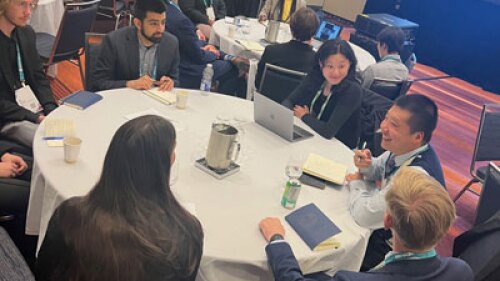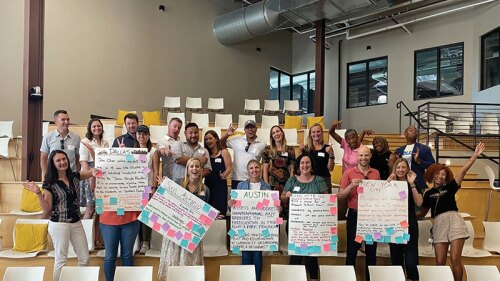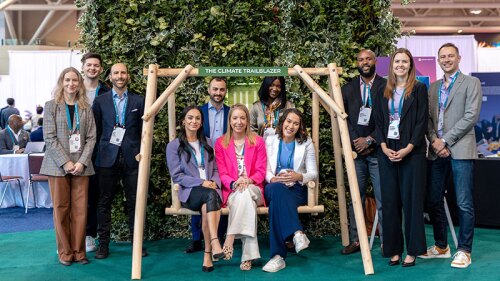A decade ago, Kathleen Carey, then a senior vice president at GE Capital Real Estate, was determined to conduct what she referred to as an “informal, unconventional survey” of friends. They were all in primarily senior positions in the commercial real estate industry. Carey, who later served as president and chief executive officer of the ULI Foundation, wanted to find out if there was a need for an organization that would focus on promoting women into leadership roles within the industry.
“I just started calling people I knew from ULI and asking them, ‘Do you think we still need this? Or has the need dissipated?’” she recalls. “‘Is everything great? Do people get the leadership positions that they want regardless of gender or any other orientation?’ They started to laugh at me and said, ‘Oh no. It’s not over. There’s still a long way to go here.’”
There was a consensus among the men and women whom Carey polled that the struggle was not over yet and that a need also existed for a group to advocate for women both at ULI and in the commercial real estate industry as a whole. From that beginning, the ULI Women’s Leadership Initiative (WLI) was born.
Carey, joined by friends and colleagues, met to craft WLI’s mission statement that would “precisely articulate what this group was going to be about and what we hoped to achieve that would endure,” she says.
Since then, the number of women in ULI has more than doubled. It has risen from 20 percent of the Institute’s nearly 28,000 members to more than 13,000 women members, or 29 percent of the 45,000 total members. Carey says the organization has “just exploded beyond my wildest imagination.”
Ellen Klasson, chair of the WLI Executive Committee and managing director at Terra Search Partners, says the goal is for that number to grow exponentially. Klasson says the mission of WLI is now just as important as ever.
“Only about one-third of the industry is female and about half the population is female, so we don’t have our fair share of representation in the industry, much less in leadership roles in the industry,” Klasson says. “Many would say that it’s the good old boys’ club, so I want to be able to participate in helping to change that and have some more parity when it comes to gender in our industry.”
Out of 1,200 ULI members surveyed in the Women’s Leadership Initiative’s first comprehensive research study, Women in Leadership in the Real Estate and Land Use Industry, released in 2015, many polled stressed how establishing industry relationships outside of their own companies was tantamount to their success. Klasson maintains that the importance of allies for women is key.
“We’re lucky at ULI that we have men on our executive committee who are real, true advocates of women, and I think we just need more men to really put themselves in the shoes of women and make sure that they are giving opportunities equitably throughout the organizations,” she says.
Clare De Briere, executive vice president at Skanska USA Commercial Development and a member of ULI’s Diversity, Equity, and Inclusion (DEI) Committee, says she has seen improvements in recent years. When she began in the industry 30 years ago, she recalls being the “only woman at the table.” Now she says that is no longer the case, but WLI still has more work to do.
“I think what the Women’s Leadership Initiative needs to continue to focus on is to provide the leadership opportunities within ULI and ensure that we are constantly pushing for those leadership opportunities for women,” says De Briere, who is also a former chair of ULI Los Angeles. “That means ensuring that there are women in senior levels who have mentoring opportunities.”
To address this, WLI recently piloted a mentoring program that connected women beyond their immediate geographic region and provided access to discussions with and guidance from industry leaders.
The WLI Circles program, designed for a small group of women, provides an opportunity in which full members of the Institute are able to meet and have honest, heartfelt discussions and get logistical support from ULI staff. The women meet monthly and are organized by dedicated leaders.
A total of 52 women, with 20 percent being women of color, participated in the meetings. Each of the four circles had a facilitator and guest speakers.
Ada Chan, a ULI Los Angeles member and senior vice president of commercial real estate banking at Bank of America, says she missed having female mentors earlier in her career.
“I didn’t have too many women mentors or peers and wanted to build camaraderie with more women in the industry who are also full members of ULI,” she says. “It was through Circles that I really felt there was a camaraderie within our group, that we had each other’s back.”
Architect Gianna Pigford, who previously was the WLI chair for ULI Dallas–Fort Worth, also participated in the Circles program. She says it opened up opportunities for her and that she appreciated being able to talk freely without fear of retribution.
“Having the support of someone who champions you is what helps a lot of people get ahead, and being a woman of color, you don’t always have that,” says Pigford, who is also on the WLI Executive Committee. “I never thought that I would.”
Today, WLI is a critical component of ULI’s DEI strategy, and a team of professionals, working alongside members, is responsible for implementing this strategy toward accomplishing its goals daily.
Sonia Huntley, ULI senior vice president of diversity, equity, and inclusion, says WLI has been at the genesis of ULI’s DEI work and laid the foundation for infusing actionable applications across the Institute. “The value WLI has contributed to accelerating the representation of women as members of ULI in its first 10 years is immense,” Huntley says. “And building on what WLI has accomplished and gleaning meaningful practices to inform and further DEI efforts across the Americas region and the industry puts us at a great advantage for executing ULI’s overall DEI strategy.”
Collete English Dixon, a global governing trustee and member of ULI’s DEI Committee, says many strides need to be made for parity to be achieved in the industry. That is true for Black, indigenous, and people of color (BIPOC) women in particular.
“One of the interesting problems about attracting BIPOC women into this industry is you’ve got to get them in the pipeline to begin with,” says Dixon, a ULI Chicago member and executive director of the Marshall Bennett Institute of Real Estate at Roosevelt University. “We all have some work to do around that.”
The lack of diversity in commercial real estate is an important issue. More than 75 percent of senior executive positions in the commercial real estate industry nationwide are held by white men, according to a recent Bella Research Group and Knight Foundation study. Only 14.1 percent of the positions are held by white women, 1.3 percent by Black men, and fewer than 1 percent by women of color.
De Briere says “there has to be intention around creating true diversity” in the industry.
ULI district councils offer opportunities for women who are members to network, lead, and advance their careers through the councils, with 46 WLI committees in the Americas region. Globally, 53 WLI committees represent district and national councils in 10 countries.
WLI also offers Prologis Achievement Award Scholarships yearly for 10 women rising stars worldwide who attend the ULI Fall or Spring Meeting and are paired with a mentor and invited to a product council. There have been 70 scholarship recipients to date.
Gwyneth Jones Coté, president of ULI Americas, says, “WLI is positioned well to continue its high-impact programming and ensuring women’s voices are not only heard, but regarded for their expertise.” And this emphasis on elevating women as leaders and subject-matter experts is not a temporary objective. “You’ll see this during our 10th anniversary year and beyond.”
Stay tuned for future stories related to the Women’s Leadership Initiative’s 10th anniversary that will highlight more of WLI’s history, achievements, and stories.
KAREN JORDAN is a Los Angeles–based freelance writer.







